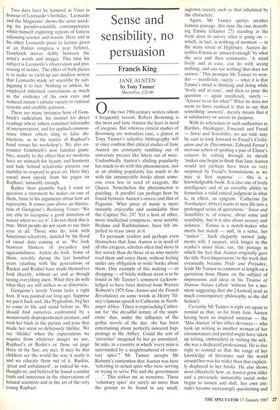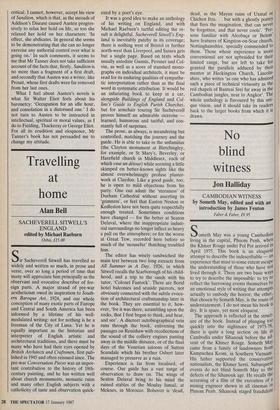Sense and sensibility, no persuasion
Francis King
JANE AUSTEN by Tony Tanner Macmillan, f20.00 0 f the two 19th-century writers whom I frequently reread, Robert Browning is the most and Jane Austen the least in need of exegesis. But whereas critical studies of Browning are nowadays rare, a glance at Tony Tanner's selective bibliography will at once confirm that critical studies of Jane Austen are constantly tumbling out of university presses like litters out of mice. Undoubtedly Austen's abiding popularity has much to do with this phenomenon, just as an abiding popularity has much to do with the innumerable books about some- one even less in need of exegesis, the Queen. Nonetheless the phenomenon is puzzling. A parallel can perhaps here be found between Austen's oeuvre and that of Paganini. What piece of music is more instantly enjoyable and assimilable than the Caprice No. 24? Yet a host of other, more intellectual composers, most notably Brahms and Rachmaninov, have felt im- pelled to tease away at it.
To persuade readers and perhaps even themselves that Jane Austen is in need of all this exegesis, scholars often find more in her novels than do those of us who merely read them and enjoy them, without feeling under any obligation to write books about them. One example of this making — or dropping — of bricks without straw is to be found in Mr Tanner's comment (acknow- ledged to have been derived from Warren Roberts's 1979 Jane Austen and the French Revolution) on some words in Henry Til- ney's famous speech to Catherine in North- anger Abbey. Tilney is reproaching Cather- ine for 'the dreadful nature of the suspi- cions' that, under the influence of the gothic novels of the day, she has been entertaining about perfectly innocent hap- penings at the Abbey. Could the sort of 'atrocities' imagined by her go unnoticed, he asks, in a country in which 'every man is surrounded by a neighbourhood of volun- tary spies'? Mr Tanner accepts Mr Roberts's contention that Austen was here 'referring to actual spies who were serving or trying to serve Pitt and the government . . .'. This strikes me as nonsense. These 'voluntary spies' are surely no more than the gossips to be found in any small,
ingrown society such as that inhabited by the characters.
Again, Mr Tanner quotes another famous passage, this time the one describ- ing Emma (chapter 27) standing at the front door to survey what is going on which, in fact, is nothing of moment — in the main street of Highbury. Austen de- scribes Emma as 'amused enough' by what she sees and then comments: 'A mind lively and at ease, can do with seeing nothing, and can see nothing that does not answer.' This prompts Mr Tanner to won- der — needlessly, surely — what it is that Emma's mind is thinking and doing while `lively and at ease', and then to pose the question — again needlessly, surely 'Answer to or for what?' What he does not seem to have realised is that to say that something 'answers', merely means that it is satisfactory or serves its purpose.
With its references to such authorities as Barthes, Heidegger, Foucault and Freud — Sense and Sensibility, we are told, may be said to look forward to Freud's Civilis- ation and its Discontents, Edward Ferrar's nervous action of spoiling a pair of Elinor's scissors by cutting through its sheath `makes one begin to think that Jane Austen would not perhaps have been so very surprised by Freud's formulations as we may at first suppose' — this is a ' knowledgeable book. It is also one of lively intelligence and of an enviable ability to formulate a valid critical judgment in what is, in effect, an epigram. 'Catherine [in Northanger Abbey) wants to turn life into a prolonged series of quotations.' Sense and Sensibility is, of course, about sense and sensibility, but it is also about secrecy and sickness.' Emma is a match-maker who meets her match — and, in a sense, her "maker".' Such elegantly turned judg- ments will, I suspect, stick longer in the reader's mind than, say, the passage in which the fact that Austen originally gave the title 'First Impressions' to the work that eventually became Pride and Prejudice, leads Mr Tanner to comment at length on a quotation from Hume on the subject of impressions and ideas in his Treatise of Human Nature (albeit 'without for a mo- ment suggesting that she [Austen] read as much contemporary philosophy as she did fiction').
Certainly Mr Tanner is right yet again to remind us that, so far from Jane Austen having been an inspired amateur — the 'Miss Austen' of her sillier devotees — who took up writing as another woman of her circumstances and period might have taken up tatting, embroidery or visiting the sick, she was a dedicated professional. He is also right to remind us that the range of her knowledge of literature and the world around her was far wider than that explicit- ly displayed in her books. He also shows most effectively how, as Austen grew older and a previously immutable social order began to loosen and shift, her own atti- tudes became increasingly questioning and
critical. I cannot, however, accept his view of Sanditon, which is that, as the inroads of Addison's Disease caused Austen progres- sively to relax her hold on life, so too she relaxed her hold on her characters: 'In effect, she abdicates. In general she seems to be demonstrating that she can no longer exercise any authorial control over what is going on.' In such comments, it seems to me that Mr Tanner does not take sufficient account of the facts that, firstly, Sanditon is no more than a fragment of a first draft, and secondly that Austen was a writer, like Proust, whose first drafts were far removed from her last ones.
What I feel about Austen's novels is what Sir Walter Eliot feels about his baronetcy: 'Occupation for an idle hour, and consolation in a distressed one.' I do not turn to Austen to be instructed in intellectual, spiritual or moral values, as I do to Fielding, Thackeray or George Eliot. For all its erudition and eloquence, Mr Tanner's book has not persuaded me to change my attitude.











































 Previous page
Previous page